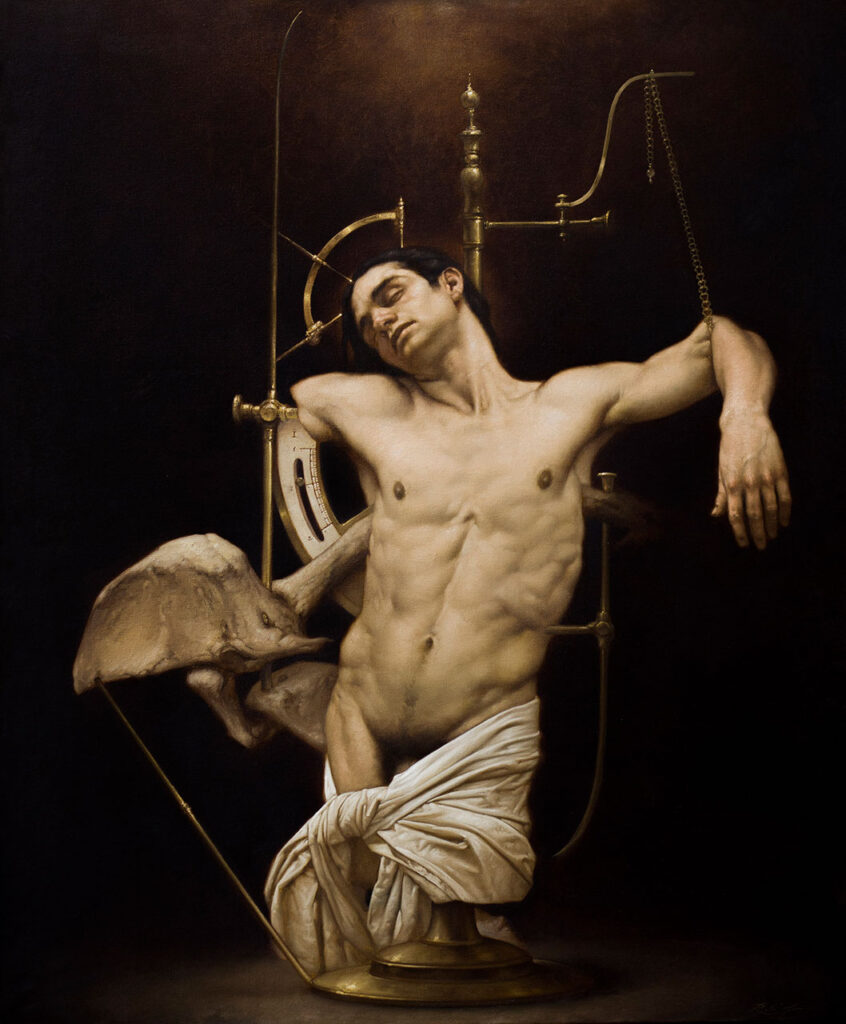5 Reasons to Take Part in Wrocław Off Gallery Weekend
Wrocław Off Gallery Weekend is a unique event that is organized in Wrocław, Poland on the October 18–20, 2024. It networks and unites various...
Guest Profile 16 October 2024
17 June 2024 min Read
People often picture contemporary art as a mixed-media practice on current topics set apart from classic styles. However, the art of Roberto Ferri can hardly be bracketed with this broad definition. The Italian artist studied the techniques of old masters but added a twist: His subjects, albeit religious and mythological, feature contemporary elements of symbolism and surrealism. This earns him the title of the modern Caravaggio.
Roberto Ferri, born in 1978 in Italy, grew up in a small town near Rome. The artistic tradition there cultivated his love for visual arts and creative expression. He went to the Liceo Artistico “Lisippo” of Taranto in 1996 with support from his parents to receive training in academic art.
He then enrolled in the Academia di Belli Arti di Roma, an institution established in the late 1500s that had educated many renowned artists, such as Pino Pascali, Marco Tirelli, and Jannis Kounellis. There, Ferri spent time in local museums on his instructor’s advice, sketching historical artworks as he studied the old masters with extreme attention to detail.

Roberto Ferri. Ade, 2000’s. Artist’s website.
Ferri admires artists like William Adolphe Bouguereau, Diego Rodríguez de Silva y Velázquez, and Michelangelo Merisi da Caravaggio. His anatomical studies consequently display an extreme accuracy comparable to hyperrealism. Anatomical precision is a trait present throughout Ferri’s paintings. The smallest elements, such as hair, skin, and fabric are constantly meticulously detailed. And beyond convincing forms, the character, strength, or vulnerability of his figures come to show.

Roberto Ferri, La Nascita Dell’ Eclissi, 2007-2010. Artist’s website.
Another defining feature of Ferri’s paintings is his Caravaggio-esque use of light. Chiaroscuro creates depth and a three-dimensional feel. The contrast between light and shadow gives volume to the human figures and their surroundings and guides the viewer’s attention. Dramatic lighting also highlights the emotional states of his main subjects or the characters, whether they convey passion, lust, pain, or agony, against a relatively flat and opaque background.

Roberto Ferri, Scissione, 2019. Artist’s website.
Roberto Ferri relies on underpainting to achieve these effects. Before adding colors, he applies monochromatic pigments on the canvas to establish the tonal elements. Ferri will then layer the colors to create depth, glazing thin and nearly translucent paints repeatedly. This method allows him to compose a space as three-dimensional and as alive as our own.

Roberto Ferri, L’Angelo, La Morte, e Il Diavolo, 2018. Artist’s website.
Ferri’s paintings combine Academism and Surrealism to produce a beautiful dialogue between the ancient and the modern. He situates the human body as the central subject of his art with more than just techniques. The human flesh is rendered then animated with references to dreams, spirituality, and mythology. To understand these elements, one must grasp the approach of academic art and Surrealism.
Academic Art, or Academicism, is a style defined by European Art academies, particularly the Académie des Beaux-Arts during the Neoclassicism and Romanticism eras. Ferri’s work carries the influence of such a scholarly practice.
Surrealism, a 20th-century movement, thrived in Europe, especially in France. It explores the unconscious and its impact on daily life, thoughts, and psychology. Surrealist artists created art from their deepest dreams, embracing absurdity over logical sense.
While Ferri’s subjects are painted in the academic style, they are made to interact with modern, metallic objects. These shiny and parasitic instruments sometimes pierce through the figures. The overall aesthetic is beautiful, passionate, and erotic. But the sight of it could be tormenting.

Roberto Ferri, Schiavo dell’ Ombra, 2017. Artist’s website.
A great example of Roberto Ferri’s mastery is the following painting of Alba Vermiglia–a mix of classical art and horror. Images from the Baroque beauty, such as the deep red cloth, mesh with a 20th-century horror film aura to give an eerie ambiance still relatable to our times.

Roberto Ferri, Alba Vermiglia, 2020. Oil color on linen. Artist’s website.
Roberto Ferri is one of the most successful contemporary artist. His distinctive style has gained him a wide reputation and access to important projects. For example, at the age of 36, the Vatican commissioned Ferri to make two portraits of Pope Francis.

Roberto Ferri, Papa Francesco, 2014. Tutt’Art.
In 2021, MAGNUM commissioned him a painting for the 700th anniversary of Dante Alighieri’s death. Roberto Ferri created Il Bacio di Dante e Beatrice (The Kiss of Dante and Beatrice), a piece that immortalizes a kiss that never occurred.

Roberto Ferri, Il Baccio di Dante e Beatrice, 2021. Artist’s website.
Roberto Ferri never loses himself amid pop culture. Nor did his vision change after his mainstream success. He remains away from the limelight, living a quiet life in a historic, nature-filled suburb of Rome that fuels his artistic imagination.
DailyArt Magazine needs your support. Every contribution, however big or small, is very valuable for our future. Thanks to it, we will be able to sustain and grow the Magazine. Thank you for your help!